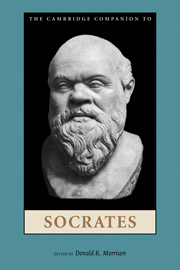Book contents
- Frontmatter
- 1 The Rise and Fall of the Socratic Problem
- 2 The Students of Socrates
- 3 Xenophon and the Enviable Life of Socrates
- 4 Socrates in Aristophanes’ Clouds
- 5 Socrates and the New Learning
- 6 Socratic Religion
- 7 Socrates and Democratic Athens
- 8 Socratic Method
- 9 Self-Examination
- 10 Socratic Ignorance
- 11 Reconsidering Socratic Irony
- 12 Socratic Ethics and the Socratic Psychology of Action
- 13 Socrates and Eudaimonia
- 14 Socrates’ Political Philosophy
- 15 Socrates in Later Greek Philosophy
- Socrates Bibliography
- Index of Names and Subjects
- Index of Passages
6 - Socratic Religion
Published online by Cambridge University Press: 28 March 2011
- Frontmatter
- 1 The Rise and Fall of the Socratic Problem
- 2 The Students of Socrates
- 3 Xenophon and the Enviable Life of Socrates
- 4 Socrates in Aristophanes’ Clouds
- 5 Socrates and the New Learning
- 6 Socratic Religion
- 7 Socrates and Democratic Athens
- 8 Socratic Method
- 9 Self-Examination
- 10 Socratic Ignorance
- 11 Reconsidering Socratic Irony
- 12 Socratic Ethics and the Socratic Psychology of Action
- 13 Socrates and Eudaimonia
- 14 Socrates’ Political Philosophy
- 15 Socrates in Later Greek Philosophy
- Socrates Bibliography
- Index of Names and Subjects
- Index of Passages
Summary
Socrates is acknowledged to have been a moral philosopher of the first order: the founder of virtue ethics and the chief exponent of the Socratic Method (the elenctic method of question-and-answer cross-examination). It is, however, also common to underplay the idea that he was very much a man of his own time in respect of the supernatural, assuming in his speech and thought the existence of gods vastly superior to ourselves in power and wisdom, and other such conventional Greek religious commitments. Of course, Socrates’ trial and execution on a charge of impiety further indicates that he did not insulate his religious beliefs from those many other novel ones he had arrived at philosophically. Rather, our texts indicate that Socrates understood his religious commitments to be integral to his philosophical mission of moral examination and rectification; conversely, he used the rationally derived convictions underlying that mission to reshape the religious conventions of his time in the service of establishing the new enterprise of philosophy. The direct legacy of that project is the rational theology of Plato, the Stoics, and others. That, in any case, is the overarching thesis of this chapter. My goal in what follows is to delineate and justify it by offering a sketch of the religious dimension of Socratic philosophy – one that illustrates the way that Socrates both challenged and renewed the religious conceptions of his time.
- Type
- Chapter
- Information
- The Cambridge Companion to Socrates , pp. 111 - 137Publisher: Cambridge University PressPrint publication year: 2010
- 7
- Cited by

